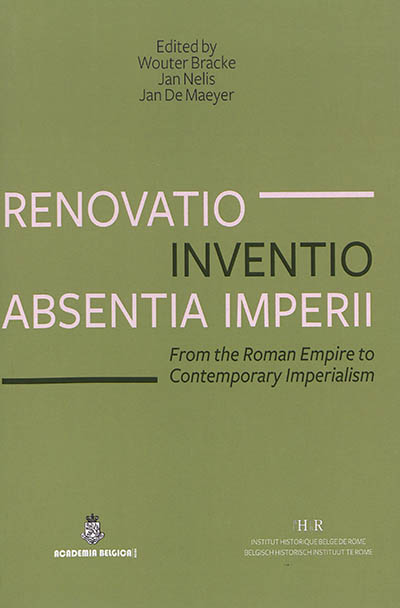en savoir plus

Carte fidélité
Permet à tous ses détenteurs d'obtenir 5% de réduction sur tous les livres lors du retrait en magasin (réduction non cumulable avec les réductions de type étudiant).
Offre également un certain nombre d'avantages auprès de nos partenaires.
Wishlist
Avec les favoris, retrouvez dans un espace les sélections effectuées au fur et à mesure de vos navigations dans le site.
Constituez pour votre usage personnel vos listes de livres en prévisions d'achats futurs et votre sélection d'articles, dossiers, événements, vidéos ou podcasts préférés ou à découvrir plus tard...
Il suffit simplement de cliquer sur "Ajout Favori" sur chaque page qui vous intéresse pour les retrouver ensuite dans votre espace personnel.
Requiert un compte Mollat
Mes Alertes
Requiert un compte Mollat
Renovatio inventio, absentia imperii : from the Roman Empire to contemporary imperialism
en savoir plus
Résumé
Des contributions étudiant, d'un point de vue historique et culturel, l'influence du modèle de l'Empire romain au fil des siècles, particulièrement en Amérique du Nord et en Europe. Sont abordées notamment les notions d'empire, d'impérialisme et les idéologies qu'elles sous-tendent mais aussi des questions d'ordre méthodologique. ©Electre 2025
Lire la Quatrième de couverture
Réduire la Quatrième de couverture
The present book is the result of the conference « Renovatio, inventio, absentia imperii. From the Roman Empire to Contemporary Imperialism », held in Brussels at the occasion of the 75th anniversary of the Academia Belgica in Rome (September 11-13, 2014). At the heart of the conference was the « reception », « Nachleben » or « permanence » of the Roman Empire, of an idea and a historical paradigm which since classical Antiquity has supported the most widespread claims to obtain and consolidate power. The volume's focus is on culture in a broad sense, i.e. including besides the arts, philosophy, religion and, most importantly, discourse. As such, a wide array of themes are subjected to academic scrutiny. Whereas the main focus is on Europe and North America, some contributors also reach out towards non-Western contexts, whether or not directly related to the Roman example. A theoretical and sociological dimension is also added thanks to the discussion on methodological issues.
More specifically, the following questions receive particular attention : what is our position as researchers, embedded in a contemporary, often Western, democratic and capitalist context ; what about the notion of empire itself, its constituent elements and the kind of ideological prerogatives to which it is generally subjected ; in other words, apart from the many historical variants and instances of reception of empire, through which filters can, and inevitably do, we approach this topic ? A question that has become ever more pregnant since the beginning of the twenty-first century, after the dissolution of the Soviet Union, the events of September 11, which have revivified what could be called American « imperialism », and at a time when an essentially economic variant, driven by « emerging » powers such as China, has increasingly contested existing power structures. In light of such meta-historical awareness, this book touches as much on the nature of the Roman Empire as it does on its historical legacy and, more importantly so, on who claims the latter inheritance throughout the most diverse epochs. By discussing some highly contrasting views upon this topic, participants explore issues that are of fundamental importance to the writing, not only of cultural history, but also of history itself.
Fiche Technique
Paru le : 10/09/2018
Thématique : Sciences politiques
Auteur(s) : Non précisé.
Éditeur(s) :
Institut historique belge de Rome
Academia Belgica
Collection(s) : Institut historique belge de Rome, études
Contributeur(s) : Editeur scientifique (ou intellectuel) : Wouter Bracke - Editeur scientifique (ou intellectuel) : Jan Nelis - Editeur scientifique (ou intellectuel) : Jan De Maeyer
Série(s) : Non précisé.
ISBN : 978-90-74461-92-4
EAN13 : 9789074461924
Reliure : Broché
Pages : VI-331
Hauteur: 24.0 cm / Largeur 17.0 cm
Épaisseur: 2.2 cm
Poids: 0 g
